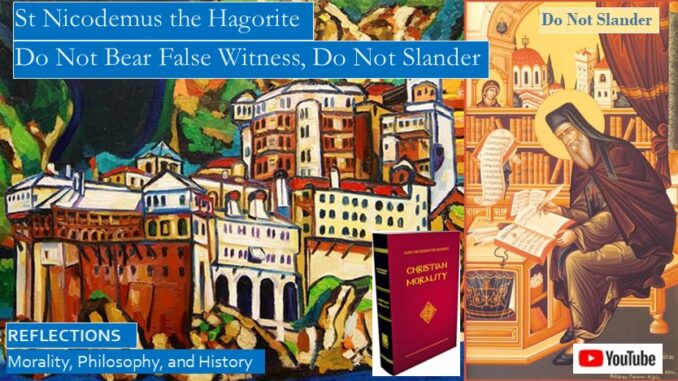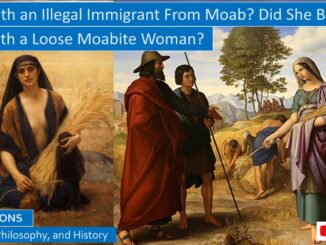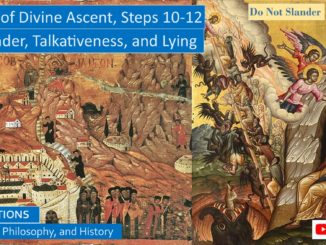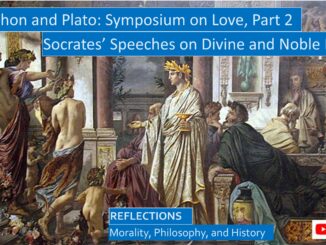
What can we learn when we reflect on the teachings of St Nicodemus the Hagiorite on the commandment warning us not to bear false witness against our neighbor, and also not to slander our neighbor, but to instead to protect his good reputation?
Why is that slander is often a more dangerous sin than any other sin we can commit against our neighbor? Can we commit the sin of slander when we are spreading the truth about our neighbor?
Script for this video, with more Amazon book links: https://www.slideshare.net/BruceStrom1/st-nicodemus-the-hagiorite-do-not-bear-false-witness-do-not-slander
YouTube video for this blog: https://youtu.be/N7GmAMl0sDg
BACKGROUND OF ST NICODEMUS
St Nicodemus was born to a wealthy family on a Greek island in the Aegean Sea in 1749, though it was nominally under Ottoman rule, it was administered by the Venetians. From an early age he studied the Eastern Orthodox Church Fathers, but he also was widely read in the Western classics, learning the Latin, Italian and French languages, he was a brilliant student. In the chapters we are currently studying in Christian Morality, in addition to the Church Fathers, he also occasionally references Plutarch, Aristotle, and the Greek Cynic philosophers, so he must also be very familiar with the Greek and Roman Stoic philosophers. His ascetic habits were a strong part of his faith.
Link to purchase On Christian Morality
https://ibmgs.org/patristic.html
YouTube video: St Nicodemus the Hagiorite, Do Not Bear False Witness, Do Not Slander
https://youtu.be/N7GmAMl0sDg
St Nicodemus: Can Christians Laugh and Joke?
https://youtu.be/WAroedUiytY
St Nicodemus joined a monastic community on Mount Athos peninsula. This is a monastic province of many monasteries, you can only practically enter by sea, and women are not permitted to stay overnight. Over his lifetime he resided at numerous monasteries, studying under various elders. These communities were granted relative autonomy by the Ottomans. One reason why he is so strict in his teachings is he desires to show the Muslims that the Orthodox Christians are the more devout.
St Nicodemus collaborated with St Makarios on scholarly projects, they both edited the Greek version of the Philokalia. He also edited the Catholic classics, Spiritual Combat and Treatise on Peace of the Soul, adding Orthodox practices. The resulting work, Unseen Warfare, was subsequently supplemented by St Theophan the Recluse, sometime in the future we will review this work.
Introduction to the Philokalia: https://youtu.be/rKVBhdHWHGI
St Nicodemus was not sympathetic to the Kollyvades movement, which was an effort in the late 1700’s to totally reject the influence of the Western Enlightenment philosophy. But St Nicodemus was also deeply traditional and deeply revered the teachings of the Eastern Church Fathers, and was a leader of the Hesychast movement, which sought to preserve the prayer tradition of the Eastern Orthodox Church, and is exemplified by the Jesus Prayer, Lord Jesus Christ, have mercy on me, a sinner, often prayed contemplatively with a prayer rope, the prayer repeated for each knot. He passed away at the age of sixty after a very productive scholarly life.[1]
ST NICODEMUS ON SLANDER
What are we taught by our teachers? Sticks and stones will break my bones, but words will never hurt me. Except that this is not true, St Nicodemus teaches us that King David, in his Psalms, feared slander more than sticks and stones, and for good reason, for words harm our reputation, which sticks and stones can never touch. Wounds heal, but suspicions linger.
St Nicodemus quotes David from his longest psalm, (Psalm 118/119) “Deliver me from the false accusation of men, and I will keep Thy commandments.” He repeats the words of St Paul, “I praise Thy name, for Thou has preserved my body from destruction, and from the snare of the slanderous tongue.” Our saint continues, “The wise Solomon exhorts us to study the Law of the Lord,” “so we can receive enlightenment, knowledge, and discretion in our souls so we can guard against slanders, false testimonies, and betrayals of deceitful men.”
These are not exact synonyms, for many Church Fathers and preachers teach us that when we maliciously spread truths about our neighbor, intending to harm him and his reputation, we are committing slander. The exception is we can be more frank when discussing the affairs of political or cultural leaders, as Luther discussed, and when providing testimony in a court of law.
Those who slander do grievously hurt others, but their slanders hurt themselves.
First, slanderers become “sons of the Devil, becoming disciples and imitators of the Devil.” “The Devil is called a slanderer, because he slandered and accused God to men, telling Adam and Eve that God, out of envy, had prevented them from eating of the Tree of Knowledge, lest they should become gods.”
Second, slanders turn slanderers into grotesque creatures.
- The eyes of slanderers “resemble the eyes of a basilisk,” the large, ugly snake in Harry Potter. These eyes cannot see the glorious works of God, but rather “see the flaws of others,” while they seek to poison them with the venom of slander.
- The mouths of slanderers are like a deep pit, and “he that is hated of the Lord shall fall into it.”
- The tongues of slanderers “are like a sharpened razor,” with their “slanders and false witnesses they cut down and slay the guileless.”
- The lips of slanderers “resemble a snare.” It was with slanderous lips that Judas betrayed Christ with a kiss.
- The hands of slanderers “are defiled by the money they receive” in payment “for false witness,” they have blood on their hands from “the harm and death they caused the innocent.”
Worst of all, this sin is easily passed on to your children. As St Nicodemus teaches us, “The children of slanderers and false witnesses do not walk the straight path of goodness, virtue, and truth,” following God, but “rather they walk on crooked paths, precipitous paths of wickedness and mendacity,” “always stumbling, always falling, always coming to grief.”
Third, slanderers ruin their own reputation, and are often hated even by those evil doers who user their slanders to destroy those who have been slandered.
How do slanderers hurt those whom they slander?
First, slanderers “harm people’s reputations,” they are gas lighters, they paint the “honorable as dishonorable, the chaste as unchaste, the pure as impure, the righteous as ruthless, the brave as rash, the thrifty as misers.” “They stir up scandals among friends,” among acquaintances, among clergy and their flock, between employers and employees, between teachers and students.
Envy also leads to slander; we have already discussed the examples from Scripture that St Nicodemus mentions. King Ahab was distraught because he envied the vineyard of Naboth, his loving evil Queen Jezebel promised him the vineyard. She planted false witnesses at a banquet that falsely accused Naboth of blasphemy, and after his execution, King Ahab was granted his vineyard. Neither the prophet Elijah nor the Lord were happy about this turn of events. And we also learned that King Ahab and Queen Jezebel were punished by God for this sin, and as Jezebel died the wild dogs of Africa tore her body apart, eating her, leaving only her heels.
Commandment, Do Not Envy: https://youtu.be/8QHrtKGDzKM
St Nicodemus retells the story of Susanna, where two peeping Toms tried to coerce her into licentious behavior. When she refused their lecherous advances, “these elders slandered and falsely testified that the chaste Susanna was a fornicator and adulteress; that she who was honorable was dishonorable; that she who was pure was impure and defiled; and they caused much distress between that righteous woman and her husband, and her relatives and the entire people of the Hebrews.” With Daniel’s assistance, Susanna’s innocence was established, and the two elders were put to death.
Second, “slanderers, and in particular false witnesses, can harm people’s property.” Bearing false witness can cause the innocent to lose a legal suit or suffer other financial loss, people can lose their businesses or their houses, or more commonly, their jobs. A friend of mine was forced to retire several years early because a female coworker falsely accused him of abusive behavior, not even legal action can erase the slight stain to his reputation.
St Nicodemus mentions the story in Maccabees about how a slanderer sought to seize the large fund that had been accumulated in the Temple to care for a multitude of widows and orphans and the Temple. The slanderer Simon told King Seleucos that this fund was far more immense than it was, and that it could be easily seized. But when the King’s official, Heliodoros, came to seize the treasure, heavenly beings, possibly angels, prevented him, frightening him and causing him to abandon this task.
https://en.wikipedia.org/wiki/Heliodorus_(minister)
Similarly, the Jesuits became skilled fundraisers because they desired that the schools they ran in Europe should be tuition-free, and the story began to be told that this religious order was fantastically wealthy. This caused several kings in Europe to envy this fantastic Jesuit wealth, and the order was shut down so the Jesuit wealth could be seized by the kings, which meant that their schools and their ministries were also shut down.
History of Jesuits through the centuries: https://youtu.be/16HRnyenOVc
Third, “slanderers, and in particular false witnesses, can harm people’s lives.”
St Nicodemus recounts that “the Chaldeans went before King Nebuchadnezzar and slandered the three youths, saying that they were not worshipping his image, so he threw them into the fiery furnace.” As you can see in the icon and the stained-glass window, an angel of the Lord came and protected the three young men from the flames.
St Nicodemus recounts that the “governors and satraps also slandered the prophet Daniel, so the king condemned him to the lion’s den.” But God closed the mouths of the lions, and he was unhurt.
St Nicodemus also recounts the story of Esther, the Jewish queen in the harem of the king of Persia, who risked her own life to save the lives of her people. “Haman slandered and betrayed the entire Hebrew nation to the king, falsely testifying that they did not observe the royal laws, that they were an insubordinate race, that they were the enemies of the king, and that their laws were contrary to those of every nation.”
Haman was planning a pogrom to massacre the Jews in the Persian empire, but after he was accused by Esther, the king was convinced of his ill intentions, and Haman was hung on the gallows he had erected to hang prominent Jews.
St Nicodemus teaches us that “the man who is a slanderer, a betrayer, or a false witness is another Judas Iscariot, who is mendacious, deceitful, unjust, and homicidal,” a plague on the human race. He points out that Jesus does not merely call Judas a demon, a mere minion of Satan, but he calls them both devils.
“St Basil teaches us that whoever maligns another, and also whoever puts up with hearing malicious talk, they both deserve to be excommunicated from the Church.”
“The Divine Chrysostom teaches us that the Devil is called by Holy Scripture a solitary wild boar because of his ferocity and uncleanness. Such is the slanderer, who also betrays and bears false witness, since he runs back and forth like a wild boar, looking for slanders to concoct against his brother, and since he rolls around in the mud of impurities and then hastens to defile others who are pure, accusing them of impurity.”
As St Nicodemus teaches us, the slanderer “breaks up friendships, sheds blood, denudes orphans, afflicts widows, destroys houses, wrecks villages, devastates cities, and annihilates entire races.” The slanderer “does not fear God,” “does not show compassion, does not listen to pleading or tears or groans. He has only one goal: to add slander to slander, betrayal to betrayal, deceit to deceit, falsehood to falsehood, thereby inflicting harm, dishonor, loss, and death.”
LISTEN TO THE ACCUSATIONS OF YOUR ENEMIES
To understand this next teaching, we must keep in mind the saying by the Greek Cynic Philosopher Antisthenes: “Pay attention to your enemies, for they are the first to notice your faults.”
The Greek Cynic Philosophers: https://youtu.be/zAAal5p8AX8
St Isaac the Syrian teaches us that “he who is truly humble is not perturbed when wronged, nor does he defend himself” when he “suffers injustice. Rather, he accepts criticisms as truth and is not concerned about persuading men that he has been slandered but asks for forgiveness.” Here I have substituted criticism for slander, or calumny in the translation, so the passage makes sense. We must think the best of our neighbor, we must presume his criticisms are not slander if we can, for how can we know if the criticism is valid? And this is true even when the criticism is meant as slander. We must be especially forgiving towards our neighbor if we suspect his motives are pure. [2]
In our next video, we will reflect on St Nicodemus’ teachings on whether Christians can joke and laugh.
Next for St Nicodemus, On Christian Morality: https://youtu.be/WAroedUiytY
CONCLUSION
As St Nicodemus teaches us in his epilogue: To escape our torments, we “must make haste to repent, to refrain our tongue from evil.” We must “keep the commandments of the Lord, not taking vengeance, but we must love our brother,” covering his sins. Show your brotherly love by refusing to “condemn him or betray him,” so the Lord will see that you indeed possess brotherly love.
This concluding teaching of St Nicodemus is clearly reflected in the classic Orthodox and Catholic Prayer of St Ephrem:
O Lord and Master of my life,
take from me a spirit of despondency, sloth, love of money, and idle talk.
But give to me, your servant,
a spirit of sober-mindedness, humility, patience, and love.
Yes, O Lord and King,
grant me to see my own sins and not to judge my brother,
since you are blessed to the ages. Amen.[3]
DISCUSSION OF SOURCES
Christian Morality was published in 1803 when St Nicodemus was in his fifties, several decades after the publication of the Philokalia, the collection of Orthodox classics published by St Nicodemus and St Makarios, and it references and repeats the teachings of many of the Church Fathers in the Philokalia, which can be clearly traced in the footnotes. My minor complaint is the translators use several words that are not currently used in English. For example, “calumnies” I rendered as deceit, and also “jape,” which is an archaic word meaning jest.
The translators defend St Nicodemus, arguing that his teachings, properly filtered, indeed should influence our behavior. “Because St Nicodemus reflects the monastic propriety of his age, and the public behavior and ethical standards of the centuries in which he lived, he is often the subject of almost sophomoric contempt, if not open ridicule, by modern critics who harshly judge his advisement against secular music, secular singing and dancing, and frivolity as inappropriate to Christian life, not to mention his advocacy of virginity as a prerequisite for marriage, the avoidance of keeping pets, and, under the influence of ruling Islamic customs,” “the veiling and virtual social isolation of women.” We need not view all of these restrictions as applicable to Christians today. But “we must realize that St Nicodemus was” “urging his fellow Christians to set a pristine example for the Moslems and Jews in the society around them.”[4]
This discussion reflects the classic debate between Stoicism and Epicureanism on the need to live an ascetic life, and the degree that you can permit entertainment and frivolity into your life, or whether you should always wear a dour stoic expression, never showing emotions. What was true in the ancient world was that you needed to belong to the upper class to be able to afford to live an Epicurean lifestyle, but that is no longer true today, the middle class and upper lower classes can afford to go to the movies and go on vacation and enjoy themselves in ways the lower classes of antiquity could only dream of.
Epicurus and Epicureans: https://youtu.be/49Qv3Be86Jw
Stoic Philosopher Seneca: https://youtu.be/m4mcP2F9c4w
Stoic Philosopher Epictetus: https://youtu.be/Dhd543kov-E
Stoic Philosopher Marcus Aurelius: https://youtu.be/0qHpReZYhv4
[1] St Nicodemus the Hagiorite, Christian Morality, translated by Hieromonk Father Patapios, Monk Father Chrysostomos, and Archbishop Chrysostomos (Belmont, Massachusetts, Institute for Byzantine and Modern Greek Studies, 1803, 2012), pp. xiii-xlviii and https://en.wikipedia.org/wiki/Hesychasm and https://en.wikipedia.org/wiki/Kollyvades .
[2] St Nicodemus the Hagiorite, Christian Morality, Discourse IV, pp. 83-112.
[3] https://en.wikipedia.org/wiki/Prayer_of_Saint_Ephrem
[4] St Nicodemus the Hagiorite, Christian Morality, pp. xlvii-liii




1 Trackback / Pingback